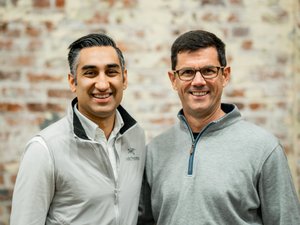
Josh Lippiner and his PingGPS team are building a personal GPS locator designed to locate kids, luggage, and even helicopters. The Ping sold-out on IndieGoGo, and raised over $1M by over 6,300 backers. Learn how PingGPS hit this rare milestone.
The story behind PingGPS started when Josh Lippiner’s daughter was going off to a public kindergarten for the very first time. “I remember, like a lot of new dads, just freaking out.” He was freaking out because, frankly, the idea of putting a six-year-old on a bus and going off to school by herself – after watching her every movement for six years – sounds insane to new parents.
“I went online and I searched to see what personal GPS devices were out there”, mentioned Lippiner – Co-founder and President of PingGPS. There was only one device and it was roughly the size of a coffee lid. He ordered it and paid the monthly fee – which enables the ability to track items globally using GPS.
Lippined recalls, “I charged it, I activated [it], and I put it into her bag.” The first day of school, he checked in on his daughter a few times throughout the day via the app – everything worked fine. The next day, Lippiner did the same thing – checked to see ‘was she at lunch or maybe recess?’
“I took out my phone, clicked on the app – nothing, no response.”
He actually drove to school just to check that nothing severe had happened, and saw his little girl on the playground. The device had died just one, measly day after fully charging it.
He thought, a better solution must exist but came up empty handed after research.
Around this same time, Tile launched and had a very, very successful campaign on Selfstarter – raising $2.6M. Lippiner was interested, but Tile uses Bluetooth to track items and is only helpful within 30 feet. “It doesn’t tell you where [an item] is, it just tells you ‘you are getting closer.’”
After six months of looking, he started to explore his own solution. “I talked with engineers all over the place about this – seeing if it can be built.”
When starting an entrepreneurial venture in Charlotte, Lippiner says, “you have to go into it eyes wide open that you’re going to be running a remote team.”
So, it was last February when he settled on an engineering design team out in Santa Barbara. After receiving a detailed engineering and feasibility report, the engineering team got underway. He separately coordinated his IndieGoGo campaign from Charlotte, while regularly keeping a pulse on the engineering progress.
At the end of that month, he flew out to pick up the device. To his surprise, the device didn’t meet his expectations – “the device was terrible.” Basically, the engineering team didn’t have the resources to devote to the project, and since Lippiner wasn’t local, he couldn’t catch this issue sooner.
With the risk of delaying the product release, he was again searching for engineering expertise. Serendipitously, during that same trip out west, he met his current CTO and engineering partner.
They righted the ship, redesigned the board, and quickly got the project and campaign back on track to deliver the pre-ordered Ping’s in October.
The campaign was wildly successful. The Ping sold out – raising over one million dollars, a milestone hit by very few companies. You can see the campaign – here.
“We are focused first and foremost on the consumer and versatility.” Several other locator companies and focus solely on kids or pets. PingGPS is open to any type of customer – travelers, cyclists, snowboarders, golfers, drone operators, string instrument manufacturers, and even helicopter owners.
Lippiner and his team are driving PingGPS with data. By utilizing marketing data they noticed not only does demand exist from varying consumer bases, but other companies are interested in embedding the Ping into their products.
This embedding business model could be a massive success for PingGPS, and he admits that founding his company in Charlotte contributed a big part to initially exploring this model. By starting here and by employing a virtual team, spread out around the world, you naturally can’t move as fast as you would with an all local team or with the seemingly endless resources in Silicon Valley. But it’s the slower pace that forces teams to be more creative in their approach, and allows them to look at data and opportunities in a different light.
Lippiner is a very active local entrepreneur – PingGPS is his third company in operations today. He also runs DMVCheatSheets – a provider of online educational materials for drivers – with his wife and Wecora – an ideation tool for creative professionals to share detailed idea boards and budgets with their clients, mostly for interior designers and event planners. He previously started and sold Lowfares.com.
He is a member of the recently launched LaunchLKN – a community of innovators and entrepreneurs who live or work in the surrounding Lake Norman area – and he’s excited about the potential that the recently announced Hub@Davidson will bring to the table.
His advice is to keep the consumer at the forefront of a solution. “Ping [is] designed with the consumer in the epicenter.” If you have an idea, start to talk with people as early as possible, and learn how they would use your product and how they would want it to look. Design with the customer not only in mind but in the driver’s seat.








